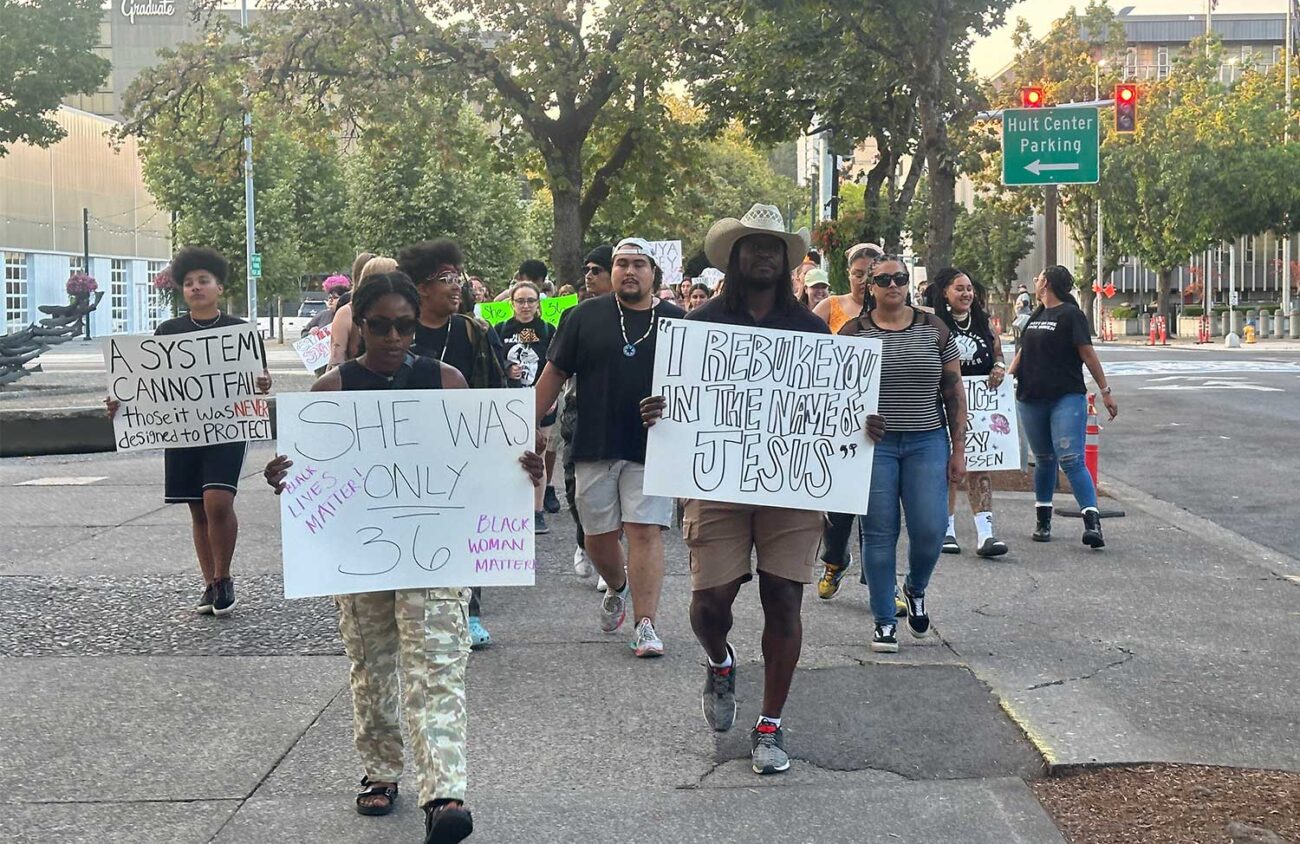On July 25, NAACP Lane County held a candlelight vigil and march for Sonya Massey, a 36-year-old Black woman and mother of two murdered in her home by sheriff’s deputies near Springfield, Illinois.
Around 50 people, including representatives from the NAACP and the Black Cultural Initiative marched around several blocks downtown near Kesey Square, voicing their rage, anger, concern and discontent.
“This Black woman is angry as hell,” said Mary Gach to the crowd in Kesey Square. “In a world where the color of one’s skin — their melanin — is reason enough to kill you.”
Another speaker, Black woman and first-grade teacher, said that Black women, ages 25 to 44, in the United States are six times more likely to be killed with firearms than white women. She said of Massey, “She apologized. She was shot. She died.”
After a moment of silence, with many holding light candles in respect for Massey, the crowd marched down West Broadway and all around downtown chanting “Say her name!” followed by “Sonya Massey!”
Andiel Brown, NAACP Lane County Branch 1119 managing director, says that anti-Black violence is woven into American history. “If we look at 75 years ago here, we see the hostility that caused the uprooting of lives,” he says. “And then we look across the country today, 75 years later, and we see the taking of lives.”
“None of them had a choice,” he says.
Adam Gilliam said he’s dealt with these feelings his whole life. “I’m 50 years old. I’ve dealt with racist society, my whole life being the product of a Black woman, having Black sisters, aunties,” he says.
“That could have been one of them,” Gilliam said.
Gach, a recent UO human physiology graduate who spoke during the vigil and participated in the march, said that America has become too comfortable with cyclical, systemic racial violence. “People acknowledge this sucks and stuff like that. And then they go back to where they’re most comfortable,” she said.
With recent conversations surrounding racial history in Eugene, Brown says it’s important to have uncomfortable dialogues in order to make Black people more comfortable. “They have to now do the opposite, prove it to be hospitable so that they feel comfortable coming back,” he says.
“And that’s what it’s gonna take,” he adds.
A Note From the Publisher

Dear Readers,
The last two years have been some of the hardest in Eugene Weekly’s 43 years. There were moments when keeping the paper alive felt uncertain. And yet, here we are — still publishing, still investigating, still showing up every week.
That’s because of you!
Not just because of financial support (though that matters enormously), but because of the emails, notes, conversations, encouragement and ideas you shared along the way. You reminded us why this paper exists and who it’s for.
Listening to readers has always been at the heart of Eugene Weekly. This year, that meant launching our popular weekly Activist Alert column, after many of you told us there was no single, reliable place to find information about rallies, meetings and ways to get involved. You asked. We responded.
We’ve also continued to deepen the coverage that sets Eugene Weekly apart, including our in-depth reporting on local real estate development through Bricks & Mortar — digging into what’s being built, who’s behind it and how those decisions shape our community.
And, of course, we’ve continued to bring you the stories and features many of you depend on: investigations and local government reporting, arts and culture coverage, sudoku and crossword puzzles, Savage Love, and our extensive community events calendar. We feature award-winning stories by University of Oregon student reporters getting real world journalism experience. All free. In print and online.
None of this happens by accident. It happens because readers step up and say: this matters.
As we head into a new year, please consider supporting Eugene Weekly if you’re able. Every dollar helps keep us digging, questioning, celebrating — and yes, occasionally annoying exactly the right people. We consider that a public service.
Thank you for standing with us!

Publisher
Eugene Weekly
P.S. If you’d like to talk about supporting EW, I’d love to hear from you!
jody@eugeneweekly.com
(541) 484-0519
